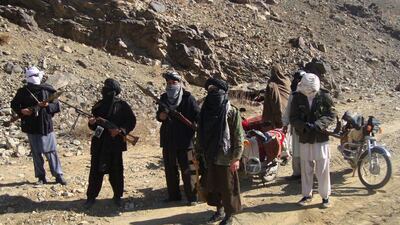Baghlan, Afghanistan // When word spread that an attack on Baghlan University was imminent, the students knew they could only run so far before the war in this part of northern Afghanistan found them again.
Classes were immediately stopped that day in the summer and the campus on the outskirts of the provincial capital, Pul-e-Khumri, was cleared. Hours later, under the cover of darkness, a rocket hit the faculty of agriculture. Other faculties were also damaged.
People held the Taliban responsible. They were probably right, but the lines are increasingly blurred in the conflict here and all sides are accused of preying on the weak, exploiting the vacuum left by the withdrawal of foreign troops.
“The students and locals do not feel safe now,” said Ahmad Fahim Sahak, 23, an economics student. “If we compare it to the situation in the past, it is very bad.”
As he spoke, explosions could be heard in the distance. Mr Sahak said it was the Afghan army shelling Taliban positions in a nearby district, then reeled off a list of recent rocket attacks on Pul-e-Khumri. One strike wounded several children going to school. “It is anarchy here,” he said.
Baghlan is a mountainous province that lies at the heart of northern Afghanistan and, like much of the country, it is now sinking deeper into bloodshed. What makes the situation here particularly worrying is the impact it could have on the future direction of the war.
The main road connecting Kabul to the north and on to central Asia runs through Baghlan and the population is ethnically diverse, with Tajiks, Pashtuns, Hazaras and Uzbeks. Any insecurity could escalate quickly, spreading into new areas and dividing communities. The government is already struggling to cope.
After the attack on the university, some female students told Mr Sahak they were now too scared to travel in taxis and busses, which are considered less secure than private transport. Police guard the campus but Mr Sahak said their presence offered little reassurance. He doubted they remained in position at night.
“I think they are right to leave because they are here to earn their salary, not to be killed,” he said.
To illustrate the dangers, he pointed out a mountain where American troops used to be stationed and said insurgents now occasionally use the area. If nothing changed and the government could not bring security, residents should invest their hope in the Taliban instead, he said.
His pessimism is a sign of the times. In April the Taliban launched a major offensive on the neighbouring province of Kunduz and came close to capturing its capital city. The fighting displaced thousands of families.
Although the situation in Baghlan is not as severe, it is getting significantly worse. Security started to deteriorate even before most foreign troops withdrew from Afghanistan and people are now more afraid than ever.
Alam Jan Mujahid, a provincial councillor, said a 15-member delegation including senior central government officials recently met elders from Dand-e-Ghori district to agree on a truce with the Taliban there.
Having helped broker the deal, he said it was the only way to stop further destruction and prevent the insurgents from capturing Pul-e-Khumri.
The Taliban run an effective shadow justice system in parts of Baghlan. In one case recounted to The National, a young woman in the district of Baghlan-e-Markazi, just north of Pul-e-Khumri, was kidnapped by her fiance after her family cancelled their engagement.
The Taliban brought together both sides of the dispute in an informal court set up in a village. The court decreed the marriage should go ahead and both families abided by the decision.
“Yes, the morale of the Taliban is high, “ said Arif Ahmadzai, a 41-year-old resident. “They are moving around freely, but they are about five or six kilometres from [the town of] Baghlan-e-Markazi.”
Complicating the situation across the province is the proliferation of heavily armed militias. Some have been backed by the government in an effort to establish security, while others appear to be nothing more than gangs controlled by warlords.
In July, 21 people were killed when gunmen attacked a wedding and on September 1, Baghlan’s top military attorney was shot dead while on his way to work in Pul-e-Khumri.
“There is no trust in the situation,” said Mr Ahmadzai. “Life is not as stable as it was before. Everyone acts above the law.”
The Afghan government had hoped that the insurgency would be weakened by Taliban infighting over who should succeed their spiritual leader Mullah Mohammed Omar.
However, Mullah Omar’s son and brother recently pledged their loyalty to the new leader, Mullah Akhtar Mansour, and the reality in Baghlan and elsewhere is that the Taliban seem to be gaining confidence.
Esmatullah, a 23-year-old mechanic, told The National that taking the main road from Pul-e-Khumri to Kunduz from late afternoon onwards was equivalent to an act of suicide.
He said he would have some hope if the government could hold out until the end of the year.
Otherwise, he said, “I think we should make ourselves into people liked by the Taliban and we can help them rule.”
foreign.desk@thenational.ae

